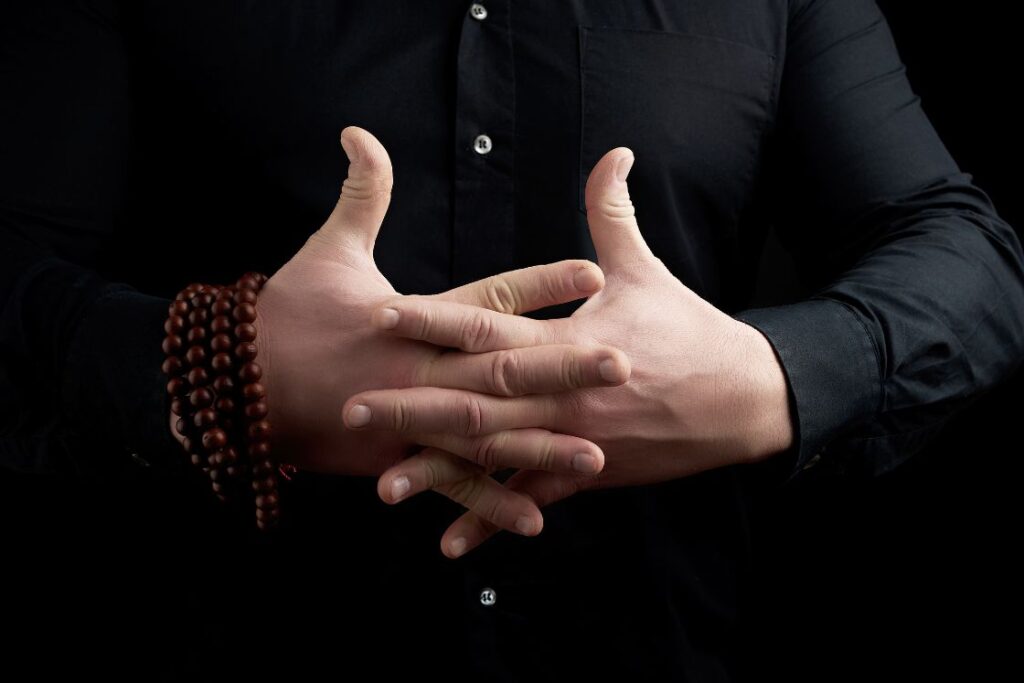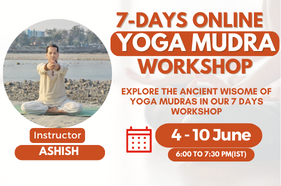
Vajrapradama Mudra is a symbolic hand gesture utilized in yoga and meditation. The term “Vajrapradama” translates to “Unshakeable Self-Confidence.” In this mudra, fingers interlock, and the hands rest on the chest with the thumbs extending sidewards. It symbolizes unshakable self-confidence, inner strength, trust, and faith in something greater, often linked to the higher self.
Meaning
The Vajrapadma Mudra derives its meaning from the combination of two Sanskrit words: ‘Vajra’ and ‘Padma.’ ‘Vajra’ represents ‘thunderbolt’ or ‘indestructible,’ signifying strength and unbreakable trust. ‘Padma’ stands for ‘lotus,’ symbolizing purity and spiritual awakening. When these elements come together in Vajrapadma Mudra, it embodies the concept of an ‘indestructible lotus.’
Vajrapadma mudra means “seal of unbreakable trust”. It’s also known as “Mudra of Unshakable Trust.” It signifies unwavering faith in the self and a commitment to spiritual growth.
In this mudra, inner strength (Vajra) and purity (signifies Padma) unite to form a powerful symbol of inner transformation and steadfast belief in one’s spiritual journey.
Significance
In yoga and meditation practice, Vajrapradama mudra is believed to channel energy to the heart chakra, reminding individuals of their inner power and strength. It promotes self-confidence, resilience, and belief in one’s own abilities. By interlacing the fingers and placing the hands on the heart, practitioners connect with their innermost selves, fostering essential self-assurance for personal growth and spiritual development.
Vajrapradama Mudra emphasizes that confidence and self-assurance are qualities that can be cultivated from within. It is a potent tool for those seeking to enhance mental and emotional well-being on their journey of self-discovery and spiritual growth.
How to Perform Vajrapradama Mudra?
just like you made benefits points above in this chat, make one benefit point on “Vajrapradama Mudra fosters trust, self-confidence, and inner strength. “
Vajrapadma Mudra is easy to perform: interlace your fingers, keep your palms open towards heart centre and extend your thumbs sideward pointing up. Rest your connected hands on your heart while maintaining a gentle, upward-facing orientation of the palms. This hand placement helps create a sense of trust and inner strength, making it a valuable addition to meditation and self-reflective practices.
To perform this mudra, follow these steps:
- Choose a comfortable sitting posture like Sukhasana, Padmasana, or even Twisting Poses like Mastyendrasana (Lord of the fishes pose).
- Make sure your neck and spine are upright to maintain good posture.
- Place your palms on your knees with your palms facing up.
- Gently close your eyes and be there for a few deep breaths.
- Then bring your palms together in Anjali Mudra.
- From Anjali mudra, interlace your fingers and open your palms toward your chest. Extend your thumbs upward.
- Keep your elbows, wrists, and palms aligned.
- Focus on your inner self and inner strength while holding this Mudra.
- Inhale slowly and exhale gently to stay relaxed and centered.
Vajrapadma Mudra can be seamlessly incorporated into a variety of yoga practices, including meditation, pranayama (breath control), and asana (yoga postures).
During mindfulness meditation, hold this mudra to enhance your focus and inner balance. In pranayama like Sama Vritti and Dirgha pranayama (aka full yogic breath) it aids in controlling the breath and directing prana. For asana, you can use Vajrapadma Mudra to deepen your connection with the poses, fostering a sense of groundedness and energy alignment.
Vajrapradama Mudra Precautions
- Avoid firmly pressing your fingers against each other; they should be slightly touching each other.
- Practice this mudra with gentle and controlled hand movements to prevent strain or injury.
- Ensure that you are in a comfortable and stable sitting posture to maintain balance.
- If you experience any discomfort or pain while practicing the mudra, discontinue it immediately.
- It’s essential to maintain a relaxed state while performing Vajrapradama Mudra; avoid tensing your muscles or gripping your fingers too tightly.
- If you have any pre-existing hand or wrist injuries, consult with a yoga instructor or healthcare professional before practicing this mudra to ensure it’s safe for you.
Time and Duration
It is recommended to perform Vajrapadma mudra for about 15 minutes at a time. Practice this mudra three times a day with each session lasting 15 minutes to enhance your trust and self-confidence.
Morning, midday, and evening are excellent times to perform Vajrapadma Mudra, allowing you to maintain balance and inner harmony throughout your day.
Keep in mind that the effectiveness of mudra may also depend on your individual needs and goals, so it’s essential to listen to your body and adjust the duration accordingly. As with any yoga or mudra practice, consistency over time can lead to more profound results.
Affirmation in Vajrapradama Mudra
When holding Vajrapadma Mudra, powerful chakra affirmations that focus on inner balance, energy alignment, and personal growth can be particularly effective.
You can use this affirmation while holding Vajrapradama Mudra is: “I am filled with poise and self-confidence, and nature provides me with energy and support.” Repeat this affirmation mentally during Vajrapradama Mudra practice. It boosts self-confidence and self-trust, aligning with the mudra’s goal of strengthening inner resolve and trust.
Benefits of Vajrapradama Mudra
1. Improved Trust, Self-Confidence, and Inner Strength:
Vajrapradama Mudra, when practiced consistently, fosters a deep sense of trust and self-confidence within oneself. This mudra encourages individuals to connect with their inner strength and innate wisdom, allowing them to trust their decisions and abilities. As a result, it can lead to enhanced self-assurance and a greater belief in one’s potential, ultimately promoting personal growth and resilience in the face of life’s challenges.
2. Enhanced Mental Focus
Vajrapradama Mudra involves interlocking the fingers which creates a stable foundation for your meditation practice. Therefore Vajrapadma mudra helps channel your mental energy, sharpening your concentration and allowing you to focus on the present moment with clarity.
3. Stress Reduction
Vajrapradama Mudra hand position is such that you stimulate specific energy points in your hands, promoting relaxation and reducing stress levels. Incorporating this mudra with deep breathing, aids in calming the mind and reducing the anxiety.
4. Improved Posture:
Vajrapradama Mudra encourages an upright and balanced posture during meditation practice. This not only prevents physical discomfort but also enhances the flow of energy throughout your body, promoting vitality and bodily awareness.
5. Enhanced Respiratory Function:
Holding Vajrapradama Mudra in front of your heart centre can improve your lung capacity and deepen your breath. It aids in enhanced oxygenation and reducing respiratory issues.
6. Balancing of Energies:
Vajrapadma Mudra involves interlocking the fingers of both hands which creates a closed circuit or loop within the body. This loop is associated with the continuous flow of prana (life force energy).
Vajrapadma Mudra balances subtle energies by creating a closed circuit, allowing for the harmonious flow of prana and the balance of Ida and Pingala nadis (energy channels). This balanced energy circulation aids in chakra activation and emotional equilibrium, promoting overall well-being and inner harmony.
7. Increased Self-Awareness:
Vajrapradama Mudra connects your fingers, symbolizing the interconnectedness of your inner self. Regular practice of this mudra can lead to a heightened sense of self-awareness, fostering personal growth and a deeper understanding of your true self.
8. Aids Digestion:
The mudra’s influence on the energy channels in your hands can help with digestion. This can alleviate discomfort and improve your overall gut health.
Conclusion
Vajrapradama Mudra is a powerful mudra that embodies confidence, self-assurance, and inner strength. Its importance in yoga and meditation cannot be underestimated, as it enables practitioners to face life’s uncertainties with unwavering confidence.




